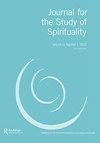精神健康护理实践
IF 0.8
0 RELIGION
引用次数: 0
摘要
珀西用预言的声音对所有现代人说话,而不一定只对那些自称“基督徒”或“圣公会教徒”的人说话。在我看来,珀西的伟大成就比我能想到的任何其他当代人都要好,他在神学上参与了社会科学,从而深化和丰富了现代精神方法,并在忠实于基督教正统的同时做到了这一点。他为寻求融合和理解人类经验和学习的慷慨、包容的精神奠定了基础。他的另一个伟大成就是帮助他的读者了解,在他看来,上帝是如何在当代文化和世俗学习中发挥作用的,而在这些背景下忽视上帝会使信仰、崇拜和理解变得贫瘠。尽管很高兴阅读本书前几部分对珀西作品的批判性评价,但我更喜欢的是后半部分珀西自己作品的节选。珀西给人的印象是牧师般的智慧、洞察力、深思熟虑、热情但不软弱——所有这些优点都体现在迷人的散文风格中。在我看来,他是当今基督教会伟大的牧师神学家之一,他将信仰与广泛的学科融合在一起,这些学科有时被视为对信仰和精神怀有敌意。因此,他的作品使精神、教堂和神学变得有吸引力,有时甚至令人兴奋!Martyn Percy对他写的很多东西都没有说最后一句话,我怀疑他会是第一个这么说的人;相反,他帮助我们批判性地思考,欢迎世俗的学习,并重新仔细思考我们如何理解21世纪的信仰和精神。他平衡了社会科学与传统和正统的学习,从而对我们构建自己、基督教精神和教会的方式提出了合理、合理和激进的挑战。这不是什么了不起的成就。如果你没有读过这本书的其他内容,那就读珀西的后记,副标题是“自我批判回顾”:它富有远见、预言性,几乎富有诗意。它总结了珀西的精神和神学的核心。本文章由计算机程序翻译,如有差异,请以英文原文为准。
Spiritually competent practice in health care
Percy speaks with a prophetic voice to all modern people, and not necessarily only to those who would describe themselves as ‘Christians’ or ‘Anglicans’. Better than any other contemporary I can think of, Percy’s great achievement, in my view, is to engage theologically with the social sciences thereby deepening and enriching a modern approach to spirituality, and doing this while staying faithful to Christian orthodoxy. He lays the foundations for a generous, inclusive spirituality that seeks to integrate and make sense of human experience and learning. His other great achievement is to help his readers to see how, in his view, God is at work in contemporary culture and secular learning, and that to ignore God in those contexts is to impoverish faith, worship, and understanding. Despite the pleasure of reading the critical appraisals of Percy’s work in the earlier parts of the book, what I enjoyed more were the extracts of Percy’s own writings in the second half. Percy comes across as pastorally wise, insightful, thoughtful, irenic but not flaccid – with all these virtues set in a winsome prose style. To my mind, he is one of the great, pastor-theologians of the Christian Church today, who has integrated faith with wide-ranging learning in disciplines sometimes regarded as implicitly hostile to faith and spirituality. As a result, his work makes spirituality, churches, and theology attractive, and sometimes exciting! Martyn Percy has not said the last word on much of what he writes about, and I suspect he would be the first to say that; rather, he has helped us to think critically, to welcome secular learning, and to re-consider carefully how we might understand faith and spirituality for and in the twenty-first century. He balances learning from the social sciences with tradition and orthodoxy, and therebyprovides a reasoned, reasonable, and radical challenge to theway inwhichwe construe ourselves, Christian spirituality, and the Church. This is no mean achievement. And if you read nothing else of this book, read Percy’s Afterword, subtitled, ‘ASelf-Critical Retrospect’: it is visionary, prophetic, and almost poetic. It summarizes the heart of Percy’s spirituality and theology.
求助全文
通过发布文献求助,成功后即可免费获取论文全文。
去求助
来源期刊

Journal for the Study of Spirituality
RELIGION-
CiteScore
2.50
自引率
7.10%
发文量
25
期刊介绍:
Journal for the Study of Spirituality is a peer-reviewed journal which creates a unique interdisciplinary, inter-professional and cross-cultural forum where researchers, scholars and others engaged in the study and practices of spirituality can share and debate the research, knowledge, wisdom and insight associated with spirituality and contemporary spirituality studies. The British Association for the Study of Spirituality (BASS) organises a biennial international conference and welcomes enquiries about membership from those interested in the study of spirituality in the UK and worldwide. The journal is concerned with what spirituality means, and how it is expressed, in individuals’ lives and communities and in professional practice settings; and with the impact and implications of spirituality in, and on, social policy, organizational practices and personal and professional development. The journal recognises that spirituality and spiritual values can be expressed and studied in secular contexts, including in scientific and professional practice settings, as well as within faith and wisdom traditions. Thus, Journal for the Study of Spirituality particularly welcomes contributions that: identify new agendas for research into spirituality within and across subject disciplines and professions; explore different epistemological and methodological approaches to the study of spirituality; introduce comparative perspectives and insights drawn from different cultures and/or professional practice settings; aim to apply and develop sustained reflection, investigation and critique in relation to spirituality and spiritual practices; critically examine the values and presuppositions underpinning different forms of spirituality and spiritual practices; incorporate different forms of writing and expressions of spirituality.
 求助内容:
求助内容: 应助结果提醒方式:
应助结果提醒方式:


